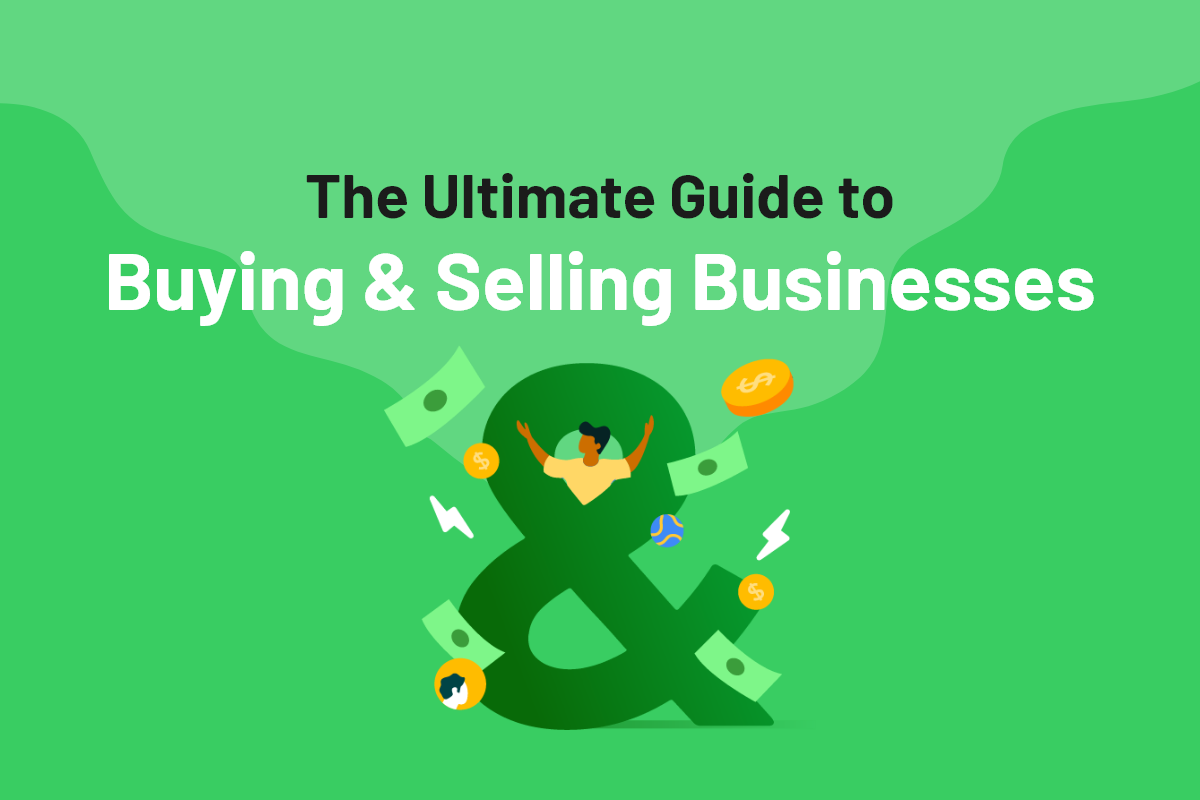Are you ready to take control of your financial future and explore the exciting world of online business? Whether you’re looking to buy an established website or sell your successful online venture, navigating the digital marketplace can be both thrilling and rewarding.
But where do you start? How do you ensure that your investment is sound, or that you’re getting the best deal for your hard-earned enterprise? Imagine having the ultimate guide at your fingertips, a roadmap that simplifies each step of buying and selling online businesses.
This guide is crafted to empower you with clear strategies, insider tips, and practical advice so you can make informed decisions with confidence. You’ll discover how to spot lucrative opportunities, understand the true value of an online business, and learn effective negotiation tactics. Your journey into the realm of digital entrepreneurship is about to become much clearer. Dive into this ultimate guide to unlock the potential of online business transactions and transform your aspirations into reality. Keep reading to find out how you can master the art of buying and selling online businesses, ensuring that your next venture is a resounding success.
Table of Contents
ToggleUnderstanding Online Businesses
Understanding online businesses is crucial for buyers and sellers alike. These digital ventures have transformed the global marketplace. They offer flexibility and vast potential. Knowing the ins and outs can lead to successful transactions.
Types of Online Businesses
Online businesses come in various forms. E-commerce stores sell products directly to consumers. They can operate on platforms like Shopify or Amazon. Content websites generate income through ads and affiliate marketing. They focus on providing valuable information to their audience. Subscription services charge users a recurring fee for access to products or content. SaaS businesses offer software solutions through online platforms. They often have a recurring revenue model.
Key Characteristics
Successful online businesses share common traits. Scalability is vital; they can grow with demand. They often have low overhead costs compared to physical stores. A strong online presence is essential for attracting customers. Reliable website traffic ensures consistent revenue streams. Customer engagement and satisfaction play a critical role. Technology and innovation drive many online business models. An adaptable business can respond quickly to market changes.
Evaluating Online Business Opportunities

Credit: appsumo.com
Discover how to evaluate online business opportunities effectively. This guide simplifies buying and selling processes, offering insights into potential profits and risks. Learn to assess digital assets confidently for successful transactions.
Evaluating online business opportunities can feel like stepping into a bustling marketplace filled with potential. As you sift through the options, understanding the landscape is crucial. The right business can offer growth, but how do you know which one is worth your time and investment? Let’s break it down step-by-step to ensure you make informed decisions.
Market Trends
Understanding market trends is like having a map in a new city. Are there more people buying pet products online, or is there a surge in eco-friendly goods? Look for businesses that align with growing trends. This could mean a spike in demand or emerging niches. Stay informed by following industry reports, subscribing to relevant newsletters, and joining forums where experts discuss changes in consumer behavior.
Growth Potential
Imagine buying a business that doubles its revenue in a year. Growth potential is your ticket to success. Evaluate the scalability of the business model. Can it expand its product line or reach new markets? Consider your own skills and resources. Are you equipped to push the business forward or will it require outside help? ###
Risk Assessment
Every opportunity comes with risks. Are you ready to face them? Assessing risks helps you prepare for obstacles. Identify potential challenges like competition, market saturation, or changing regulations. How do they affect the business? Think about your risk tolerance. Would a volatile market keep you up at night? Balance potential rewards with risks to make a confident decision. Evaluating online business opportunities requires careful consideration and research. How do you weigh options effectively? By focusing on market trends, growth potential, and risk assessment, you position yourself for smart investments. Remember, the goal is not just to buy a business, but to buy the right one.
Preparing to Buy an Online Business
Preparing to buy an online business requires careful planning and consideration. This step is crucial for ensuring your investment aligns with your goals. With proper preparation, you can minimize risks and maximize potential gains. Focus on understanding the market and setting clear criteria for your purchase. Let’s explore key aspects of preparing to buy an online business.
Setting a Budget
Start by defining your financial limits. Determine how much you can comfortably invest. Consider your savings and any potential financing options. Establishing a clear budget helps narrow down choices. It prevents overspending and aligns your purchase with financial goals. Assess the costs involved beyond the purchase price. Factor in operational costs, marketing, and any improvements needed post-acquisition.
Identifying Niche Markets
Selecting the right niche is vital. Focus on areas you understand or have interest in. Research trending markets and consumer demands. Analyze competition within the niche. Look for gaps or unmet needs. Understanding niche dynamics aids strategic positioning post-purchase. It helps identify growth opportunities and potential challenges. Choose a niche that aligns with your skills and passions.
Sourcing Opportunities
Explore various avenues to find potential businesses for sale. Browse online marketplaces like Flippa or Empire Flippers. Network with industry professionals and attend relevant events. Use social media groups to discover off-market deals. Connect with brokers specializing in online businesses. Keep track of promising leads and evaluate them thoroughly. Ensure you have enough options before making a decision.
Due Diligence Process
Buying or selling an online business is an exciting venture, but it’s crucial to conduct thorough due diligence. This process helps you understand the true value of a business and identify any potential risks or hidden challenges. Think of it as your detective work—your mission is to gather all the facts before making a decision. Let’s dive into the key aspects of due diligence that you should never overlook.
Financial Analysis
Understanding the financial health of a business is paramount. Start by reviewing the income statements, balance sheets, and cash flow statements. Compare current numbers with past performance to spot trends. Are profits consistently growing, or do they fluctuate wildly?
Examine expenses and look for any unusual spikes or recurring costs that could affect profitability. Also, check for any outstanding debts or liabilities. These financial insights give you a clearer picture of the business’s sustainability. Would you be comfortable taking on its financial history?
Traffic and Seo Evaluation
Traffic is the lifeblood of any online business. Use tools like Google Analytics to analyze visitor trends. How many unique visitors does the site attract monthly? Are there seasonal dips or peaks?
Evaluate the SEO performance by checking keyword rankings and backlink profiles. A site with strong SEO might be easier to maintain and grow. Consider the source of traffic—is it organic, paid, or referral? Understanding this can help you plan future marketing strategies. Is the traffic reliable, or would you need to invest heavily in driving more visitors?
Legal Considerations
Legal issues can be a deal-breaker. Ensure all licenses, trademarks, and contracts are valid and transferable. Are there pending legal disputes or compliance issues that need addressing?
Review the terms and conditions, privacy policies, and any other legal documents related to the business. It’s crucial to ensure these are up-to-date and compliant with current laws. Would you be prepared to handle any legal complications that arise?
Due diligence is more than just ticking boxes. It’s about asking the right questions to uncover the true value and potential pitfalls of a business. Are you ready to dive deep and uncover the truth behind your next investment?
Negotiating the Purchase

Credit: quietlight.com
Negotiating the purchase of an online business involves understanding value, setting clear goals, and effective communication. This ultimate guide simplifies the process, offering practical tips to help buyers and sellers reach favorable agreements. Learn to navigate this crucial step with confidence and clarity.
Negotiating the purchase of an online business is a critical phase that demands careful attention and strategic thinking. This stage can make or break your investment, as the ultimate goal is to secure a deal that benefits both the buyer and the seller. Understanding the nuances of negotiation will empower you to make informed decisions and secure the best possible terms.
Valuation Methods
Understanding how online businesses are valued is crucial. Common methods include the earnings multiple approach, where the business value is calculated based on its annual profit multiplied by an industry-standard figure. Other factors like traffic, brand strength, and growth potential also influence value. It’s essential to assess which method aligns best with the specific business you’re considering. This knowledge arms you with the information needed to enter negotiations confidently.
Offer and Counteroffer Strategies
Making an offer isn’t just about naming a price. Consider starting slightly below your maximum budget to leave room for negotiation. Craft your offer by highlighting what you’re bringing to the table, such as a quick closing process or a cash payment. Prepare for counteroffers; this is where the real negotiation begins. Be ready to adjust your stance while maintaining your bottom line. Think about what aspects of the deal are negotiable—price, payment terms, or even support from the seller post-sale. Are you prepared to walk away if the terms aren’t favorable?
Closing the Deal
Once you’ve agreed on the terms, it’s time to close the deal. Ensure all agreements are documented in a formal contract to protect both parties. A letter of intent might be the next step, outlining the agreed terms before finalizing the purchase agreement. Utilize the expertise of a lawyer or business broker to review the contract, ensuring every detail is accurate and enforceable. Remember, closing is not just a transaction but the beginning of your new business venture. Are you ready to take the reins and steer it towards success?
Transitioning Ownership
Transitioning ownership in buying and selling online businesses is crucial. It involves strategic planning and seamless execution. Ensuring a smooth transition can lead to success for both parties. This phase requires attention to detail, clear communication, and efficient processes. Let’s delve into the key aspects of transitioning ownership effectively.
Integration Strategies
Integration strategies are vital in transitioning ownership. Aligning operations and systems is a priority. Assess the current processes and identify areas for improvement. Implement tools that bridge gaps and enhance workflow. Prioritize compatibility between existing systems and new ones. This minimizes disruptions during the transition.
Communicate effectively with stakeholders. Keep everyone informed about changes and integration plans. This fosters cooperation and trust among teams. Use clear timelines and milestones to track progress. Regular updates ensure everyone stays on the same page.
Managing Existing Teams
Managing existing teams requires tact and understanding. Transitioning ownership can be unsettling. Maintain transparency about changes and expectations. Communicate openly with employees to build trust.
Provide training and support to ease the transition. Equip them with necessary skills and knowledge. Recognize the value of their experience in the business. Encourage collaboration and input from team members. Their insights can be invaluable during this phase.
Maintaining Customer Relations
Maintaining customer relations is essential during ownership transition. Customers should feel secure and valued. Communicate openly about changes to reassure them. Address concerns promptly to maintain trust.
Consistency in service quality is crucial. Ensure that customer service standards remain high. Familiarize new owners with existing customer preferences and expectations. Retaining loyal customers is key to long-term success.
Implement feedback mechanisms to understand customer sentiments. Use this information to improve service and address issues. A positive customer experience during transition cements loyalty and enhances reputation.
Preparing to Sell an Online Business
Selling an online business requires careful planning. Understanding market trends and valuation methods is crucial. Optimize financial records and streamline operations for a seamless transition.
Preparing to sell an online business requires strategic planning and attention to detail. You might be eager to finalize the sale, but preparation is crucial to ensure you get the best deal. Whether you’re selling a small e-commerce store or a larger digital platform, the steps you take now can significantly impact your success.
Enhancing Business Value
Before listing your business, focus on boosting its value. Consider optimizing your website design and user experience. Small changes, like improving page load times or updating graphics, can enhance perceived value. Evaluate your product or service offerings. Are there areas for diversification or improvement? If you’ve received customer feedback, now is the time to act on it. Streamline operations to show potential buyers a well-oiled machine. Automate processes where possible and ensure your team is efficient. This will make your business more attractive and justify a higher asking price.
Documenting Business Performance
Thorough documentation is key to a successful sale. Start by organizing your financial records. Buyers will want to see profit and loss statements, balance sheets, and cash flow reports. Maintain detailed analytics of your website and social media performance. Traffic sources, conversion rates, and customer demographics provide valuable insights. Presenting clear data builds trust and confidence with potential buyers. Include any testimonials or case studies that highlight your business’s strengths. Real-life examples of satisfied customers can be persuasive selling points.
Identifying Potential Buyers
Identifying the right buyer is as important as preparing your business. Do you envision selling to an individual, a competitor, or a larger company? Each buyer type has different interests and concerns. Research platforms where your ideal buyer might be searching. Websites like Flippa and Empire Flippers specialize in online business sales. Listing your business on these platforms can increase visibility. Network within your industry to find interested parties. Attend online forums or industry events to connect with potential buyers. Personal connections can often lead to smoother transactions. Preparing to sell your online business is a journey that demands attention and care. Which step will you tackle first to ensure a successful sale?
Marketing Your Online Business
Marketing your online business is crucial to attracting potential buyers. A well-marketed business listing can make all the difference. It helps you stand out in a crowded marketplace. You want buyers to see the value and potential in your business.
Crafting a Compelling Listing
Start by highlighting your business’s unique selling points. Describe what makes it special. Include key metrics like revenue and traffic stats. Use clear and concise language. Avoid jargon. Make sure the listing is easy to read. Engage potential buyers with a strong headline. Provide detailed information about the business model. Explain why it’s profitable. Offer insights into future growth opportunities. This helps buyers visualize success.
Utilizing Online Marketplaces
Online marketplaces are great for visibility. They attract a wide range of buyers. Choose a platform that fits your business niche. This ensures you reach the right audience. Optimize your listing with keywords. This improves searchability. Provide high-quality images. They enhance the listing and attract more attention. Respond promptly to inquiries. This builds trust and credibility.
Leveraging Networking
Networking is powerful in business transactions. Connect with industry experts. They can provide valuable advice and referrals. Join online forums and groups. Engage with members and share your listing. Attend virtual events and webinars. Meet potential buyers and build relationships. Networking expands your reach beyond traditional methods. It helps you find the right buyer faster.
Navigating the Selling Process
Embarking on the journey of selling an online business can be exhilarating yet daunting. The process involves multiple steps and decisions that can impact the final outcome significantly. Are you prepared to navigate through the maze of finding the right buyer, negotiating terms, and sealing the deal? If you’re nodding along, let’s dive into how you can master the selling process with confidence and clarity.
Screening Buyers
Finding the right buyer is like searching for a needle in a haystack. You want someone who aligns with your business values and has the resources to take it forward. Examine their financial stability and previous business acquisitions to gauge their commitment.
Don’t shy away from asking potential buyers about their plans for your business. This can provide insights into whether they genuinely care or are merely looking for a quick investment. Trust your instincts; if something feels off, it probably is.
Remember, a thorough screening process saves you from future headaches. Create a checklist of criteria that matter most to you in a buyer. This will streamline your efforts and keep your focus sharp.
Handling Negotiations
Negotiation is where the magic happens—or unravels. Approach it with a clear mind and specific goals. Know your bottom line and be ready to walk away if terms aren’t favorable.
Be prepared to handle counteroffers. Buyers might request adjustments to the price or terms. Stay firm on non-negotiables but be flexible where possible; it can make or break the deal.
Think of negotiation as a game of chess, where each move impacts the outcome. Strategize your offers and responses. Are you ready to play your best hand?
Finalizing the Sale
Congratulations, you’re nearing the finish line! Finalizing the sale involves ironing out all the legal and financial details. Ensure all paperwork is in order and consult with legal advisors to avoid any pitfalls.
Once everything is signed and sealed, focus on a smooth transition. Support the buyer with necessary information and guidance. This fosters goodwill and a positive reputation.
Reflect on your journey. Selling your business is a monumental achievement, and the lessons learned will serve you well in future endeavors. What’s next on your horizon?
Post-sale Considerations
Post-sale considerations are crucial for smooth transitions after buying or selling online businesses. Ensure all agreements are honored and responsibilities are clear. Address financial, legal, and operational issues to prevent future complications.
After successfully buying or selling an online business, you might think the hard work is over. However, there are crucial steps to take to ensure a smooth transition and future growth. Post-sale considerations can make or break the long-term success of your business transaction.
Transitioning Responsibilities
Transitioning responsibilities is a critical step after the sale. The buyer and seller need to clearly define roles and duties during this period. A detailed transition plan can prevent misunderstandings and ensure that business operations continue smoothly. Consider creating a checklist of tasks that need to be transferred. This might include handing over login credentials, explaining operational processes, or introducing key contacts. A well-managed transition can foster trust and set a positive tone for future collaboration.
Financial Management
Financial management doesn’t stop after the sale is finalized. You need a plan to manage new financial realities and maintain business health. This includes tracking revenue, managing expenses, and planning for taxes. It’s wise to consult with a financial advisor who can offer tailored advice. They can help you understand cash flow projections and budget effectively. Good financial practices can lead to increased profitability and long-term success.
Future Investment Opportunities
Selling or buying a business opens doors to new investment opportunities. Think about how you can use the proceeds or newfound assets to grow your portfolio. Whether it’s reinvesting in the existing business or diversifying into new ventures, opportunities abound. Ask yourself what aligns with your long-term goals. Is there an emerging market you’re interested in, or a technology you believe in? By staying proactive and curious, you can make wise decisions that pave the way for future success. Ultimately, post-sale considerations are vital steps that can greatly impact your entrepreneurial journey. What steps are you taking to ensure a seamless transition and continued growth?
Frequently Asked Questions
What Kind of Online Business Is Most Profitable?
E-commerce businesses often lead in profitability, offering scalable opportunities and global reach. Digital products, like online courses, have high margins. Dropshipping eliminates inventory costs, enhancing profitability. Affiliate marketing thrives on low overheads. Subscription services provide recurring revenue. Choose a niche with high demand for best results.
What Is the Best Online Business to Start for Beginners?
Starting a dropshipping business is ideal for beginners. It requires low upfront costs and no inventory management. Focus on a niche market, leverage online platforms like Shopify, and use effective marketing strategies. Dropshipping allows flexibility and scalability, making it a great entry point into online entrepreneurship.
Can You Make Money Buying and Selling Online?
Yes, you can make money buying and selling online. Use platforms like eBay, Amazon, or Etsy. Identify profitable products, buy at low prices, and sell at higher prices. Research market trends and customer demand to maximize profits. Stay updated with e-commerce strategies for success.
Is Online Selling Still Profitable?
Online selling remains profitable due to increasing internet usage and e-commerce growth. Success depends on market research, quality products, and effective marketing strategies. Adapting to trends and customer needs boosts profitability. Optimize your online presence for better visibility and sales conversion, ensuring you stay competitive in the evolving digital marketplace.
Conclusion
Navigating online business transactions can seem daunting. Yet, it offers great rewards. Both buying and selling require careful steps and thorough research. Always check financial health and market trends. Build strong relationships with sellers or buyers. This ensures smoother deals.
Stay informed about industry changes. Use trusted platforms for secure transactions. Seek expert advice when needed. Your journey in buying or selling can be successful. With the right approach, success is within reach. Remember, patience and knowledge are key. Happy trading!




